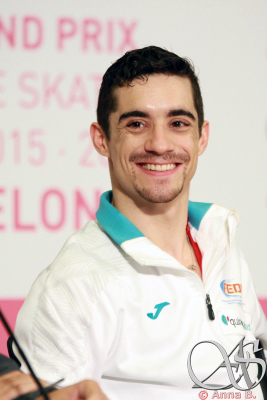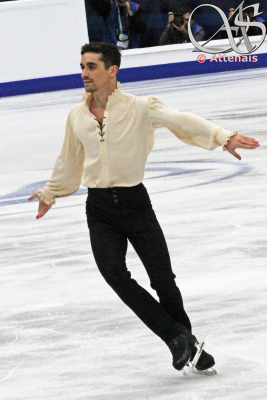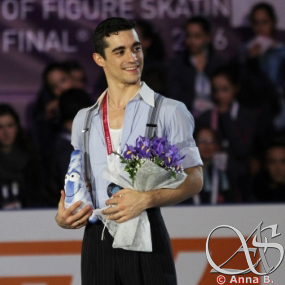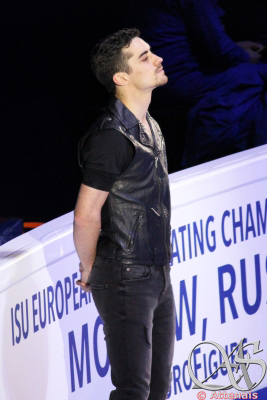Javier Fernandez: "Why add more quads?"
February 17, 2018
By Titanilla Bőd (Új Szó)
Photos © Anna Bertoloni, Irina Teterina (Attenais)
 What are the smart tactics when it comes to quads, how to achieve the perfect mental state before a competition and what would an Olympic medal mean for Spain? Six-time European champion Javier Fernandez answered all these questions with his typical honesty in a group interview at the European Championships in Moscow in January.
What are the smart tactics when it comes to quads, how to achieve the perfect mental state before a competition and what would an Olympic medal mean for Spain? Six-time European champion Javier Fernandez answered all these questions with his typical honesty in a group interview at the European Championships in Moscow in January.
More and more skaters add more and more quads to their programs. How do you view this trend?
There are two different ways to make your program more complicated. Either it is adding more difficulty to the jumps, or, as in my case, doing more complicated transitions between the elements. Both ways are tricky. If you add more quads to the program, you are going to be more tired, your body will suffer more and you risk a lot. When young skaters add lots of quads all at once, they don't allow the body to accommodate and they don't feel comfortable or confident with their programs for a long time. That's why sometimes we see lots of injures. It's complicated. I think it's better to go step by step than to just throw in four or five quads in a free program and see what happens.
You've often talked about balance in a program. What do you think is the ideal number of quads in a free skate? Is it three, like you do?
What we've seen in my career and in the careers of other skaters too, is that we haven't added more quads to a program all at once. We started by adding one more triple Axel, then the next year a quad, and a few years later we added another one. We went step by step, instead of destroying everything at once. The problem with the quad is that you need so much preparation for that jump that you lose everything else. It's hard to do hard things before a quad. So if you are doing four or five quads, you've already lost too much of the transitions. And then you see others getting like 9.50s or 10s for transitions and you are like: "This is impossible!" It's impossible to have a 10 [for transitions], if in the first two and a half, three minutes there are only quads.

The ladies now skate much cleaner programs than the men's. Do you think it's because of difficulty?
Every male skater wants to push himself higher and higher. A few years ago it was the same with Yuzu and me, he added something, I added something. But this didn't stop at any point, instead it kept going. With girls it is different. Mirai [Nagasu] has a triple Axel, but it isn't like because of that twenty other girls want to throw in a triple Axel in their program! I think that's why the girls are more consistent. They go for what they know they can do. There are guys who haven't even landed one quad in practice yet, but they still go for two in the program. Why are they doing it? That's the question.
Some young girls from Eteri Tutberidze's team have landed a quad Salchow in official competitions. Do you think quads will be common in ladies' competitions too someday?
Probably yes. This sport has an evolution, some of the Russian and Japanese young girls already have difficult jumps in their programs. But we've already seen ladies doing quads, Miki Ando had a quad Salchow, and Mao Asada had a triple Axel. So there will be more quads for sure,  I just hope that it will happen step by step, one quad here, one quad there, not twenty quads all at once.
I just hope that it will happen step by step, one quad here, one quad there, not twenty quads all at once.
You are now 26 years old, is it harder to jump quads now compared to when you were younger?
If you try to have more difficult transitions, your jumps get more complicated too. Also, age does play against us. The older you are, the less strength and ability is there. When you are younger you can do more jumps or run-throughs at practice. Now I have grey hair, but it's normal, that's why at some point people stop skating, because they feel their body isn't working the same way it used to. I worked through that, I'm aware of that and I'm still fighting. Some skaters decide to step away and stop competing. If skaters are smart, they know when to stop.
Have you also adjusted your training?
For sure. Now, in a normal practice, I do two jumps of each, then I do a program, and if everything is good, I get off the ice. Why should I practice for an hour and a half if I can do everything in 45 minutes? Why spend 45 minutes extra on the ice to get tired, and maybe injured? You never know! We've had to be smarter in our training because I'm not a youngster anymore.
At the beginning of the season you said in an interview that you and Yuzuru wouldn't share the ice as often this season, you would have more separate practices.
Everybody is really stressed out this season; everybody is living the Olympic moment. Sometimes if there are too many high level skaters on the ice and everybody is stressed out, you will get stressed out as well. So sometimes the skaters are split up into different groups, it's not just Yuzu and me. It's to keep the ice a bit clearer and the atmosphere a bit more normal... But it has nothing to do with me and Yuzu personally.


How do you manage to keep your confidence when you have Yuzuru next to you, and also Nathan Chen and Shoma Uno, and you see what they do?
When I go to a competition and compare my results to guys who are doing one or two quads more I still say: "I'm not doing so badly!" (laughs) So why have more quads? My question is: does Yuzu need an extra quad? In my opinion he doesn't. But I'm not him; so I'm nobody to say anything. This is the question we skaters have to ask ourselves: do I really need it? Or is a clean program [with only three quads] enough for me to win? That's my point. I think if I do a clean program, I can be there [at the top of the podium]. But it also depends on the other skaters. I was thinking about adding a quad loop to my free program, but then I asked myself: how much time and effort would I need to make it consistent? Is it going to be worth it? And my answer was: no, probably not. Quads in general are hard. The loop is hard because your edge can slip and you can have a hard fall... Maybe if I were younger I would go for it, but not now.
You have stated many times that when it comes to success or failure at a competition, everything depends on the day. How can you prepare for that particular day so that it will be your day?
I think this is more about mental preparation.  If you are well-prepared at practices and you feel secure and sure about your programs, then you have a good chance to skate well. Mentally, if you really want to do it, you can do a clean program. If we are really focused on ourselves, on our programs, nothing will stop us. Humans are like that. For example, if you really want to do a good job at an exam, then you will [prepare well and] do it.
If you are well-prepared at practices and you feel secure and sure about your programs, then you have a good chance to skate well. Mentally, if you really want to do it, you can do a clean program. If we are really focused on ourselves, on our programs, nothing will stop us. Humans are like that. For example, if you really want to do a good job at an exam, then you will [prepare well and] do it.
What do you need to have an ideal day, and how do you work on it to achieve it?
My ordinary days are very uncomplicated, because it's really interesting how little things can upset your routine. If you have an interview before your practice, or if you have to go to the bank before your practice, it can change the entire day. That's why we try to keep mornings free. I'm just in my house, and if I need to pay bills I'll do it later, after my training is done. We try to keep every day the same; I'm trying to keep the good feeling everyday.
Dmitri Aliev said after the free skate in Moscow that he forgot his skates at the hotel before practice. Have you ever been in a situation like that? And if so, how do you manage not to let it affect your performance?
In a competition it's like this: do you let it bother you or not? I've forgotten my costume pants at the hotel, or I've forgotten my jacket, but you can't think about such things when you're on the ice doing your program. It can affect your feelings before you have to skate though. But for me, I think it wouldn't change much in competition. In practice it would be different, because you don't have the adrenaline that you have in competition, so it would bother you more.
You've often said figure skating is a sport of balance. What do you mean by that?
First of all you have to be balanced on your skates, but also in your life. You need balance inside and outside of skating. I think that's what Brian [Orser] and Tracy [Wilson] are best at, they want to keep you out of trouble, and they want to keep every day the same. That way you are balanced every day, without ups or downs. If you need something, they will be there; they try to make it easy for you. There are so many things running through our heads, and so many things we have to do that they always try to keep things really simple. 
At the last Olympics you were fourth, this time you've already stated you want a medal. Is that adding pressure?
Not really. Of course there will be pressure because it's the Olympics. But we had a talk one day with Brian and Tracy in Toronto. I was very stressed out and I went to the office. And Brian was like: "Listen, Javi. After the day you compete at the Olympics, the sun will rise again. Even if you don't get a medal, there is going to be a next day, and everything is going to be back to normal. So, why are you stressed out?" And I realized that even if I don't medal at the Olympics, it's not like my life is over. I will try my best, I will work for it, but if doesn't happen then it doesn't happen. It didn't happen in Sochi and I'm still here!
Has anything changed inside you after Sochi?
I think it kept me going. It gave me a goal. I went back on the ice and I wanted to practice more. I wasn't sad or anything. I was so happy to be back on the ice, to work and to improve. Maybe if I weren't fourth at the last Olympics, I wouldn't be here now.
What do you want to show with your performances in PyeongChang?
Of course I want to show two good programs. But I also aim for balance in my programs. I always talk about being balanced, but I also need to show it in competition for people to believe me. I think the Olympics are a perfect time for me... (long silence) to have a good skate, to enjoy. That's why it's good to have programs you like, because if the program is going well, you can enjoy it. And in my programs I can even smile. There are programs when that's impossible, like if you're doing the Black Swan. But I want to have a good feeling at the Olympics; I want to show people that I like skating.
How would an Olympic medal influence skating in Spain?
In the last few years figure skating in Spain has gotten stronger. But for most people it's hard to recognize a sport with a short history. Football and tennis have much longer stories. But hopefully, if I medal, the improvement of skating in Spain will continue. There will be more ice rinks and more skaters, and that way we might have a bigger chance to have another great skater or skaters. We already have great ice dance teams and we have a great pair. There are more ice rinks in the country, for example in one year they built two new arenas in Granada. In Canada, when they have six ice rinks in one building, it might not mean a lot. But for us in Spain it really does!




